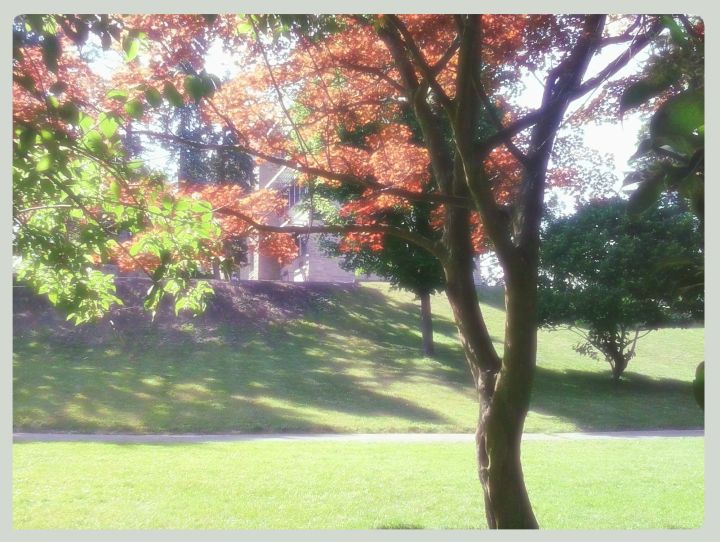 When I arrive, I dismount, and enter through the black wrought iron gates, ahead of me I can see the tower, the indomitable walls rise up over the banks of the river. I walk along the pathway that traces the edge of the hill, The Mount on my left, the river down below to my right. As I round the terraced hill the giant Oak that shelters her Grotto comes into view, and it catches my breath every time I go.
When I arrive, I dismount, and enter through the black wrought iron gates, ahead of me I can see the tower, the indomitable walls rise up over the banks of the river. I walk along the pathway that traces the edge of the hill, The Mount on my left, the river down below to my right. As I round the terraced hill the giant Oak that shelters her Grotto comes into view, and it catches my breath every time I go.
Whenever I set out for there it always feels as though I am on a pilgrimage. The flowing river at my side, the challenging hills along the parkway, the valleys of winding beauty that enchants, and the dark forests drape their branches overhead, wind in my hair, sunshine on my face, as Rose (yes, I call my vintage bike Rose, as in rambling) and I make our way towards her. For it is her that I am seeking, as much as the place.
As an old nunnery one can still find the remnants of the women who once called this place their shelter, those brides of Christ.
I’m not religious, I am instead spiritual, more of an Animist maybe one could say, and the spirit that exudes from this place has a magic that soothes.
I first came upon The Guest House On The Mount as I was riding up in the elevator at the University Hospital that sits across the road and there was an ad for this “boutique hotel” – the price of a hostel with the comforts of a B&B. It became my shelter, oasis really, while Tim was recovering from surgery to remove a gigantic cancerous tumour that had entangled itself throughout his gut and pancreas. When I wasn’t sleeping in an uncomfortable lounge chair at the foot of his bed, we would scrap enough money together so I could make my way across the road, go through those black gates, towards her shelter. The Mother.
Perhaps because I have felt out of sorts of late, but the other night I was hunting for something to engage me. A new quest perhaps, a call to action maybe? It was that feeling of uncertainty, coupled with a desire to understand the world that I saw around me. A world of such violence, dishonesty and patriarchal dogma, and then I came upon a name I had not heard in years – Marija Gimbutas.
Archaeologists of the past had decreed there was nothing of significance past a certain layer, believing that any remnants of any civilization going back further would be at most insignificant, and to be so far removed as to leave no trace.
In the 1960’s she was the first to dig past her male colleagues into the ancient landscape of ‘old Europe’, trowels scraping away the layers going back 35,000 years (give or take a few millennia) and found the cultural fragments of an egalitarian Neolithic culture.
e·gal·i·tar·i·an·ism
noun
the doctrine that all people are equal and deserve equal rights and opportunities.
She was a woman in the field surrounded by men who just did not have the background she did in old folk songs that had defined her childhood in Lithuania. Her uniqueness gave her unique eyes, and it was she who understood what this layer of neolithic debris represented.
Her childhood had taught her that the folk tales and songs throughout Europe spoke of this reverence. Women of the time she grew up with still revered the springs and natural places, they saw the presence of goddess in the rocks and the trees, in the migrations of birds, as Christianity had come only in the middle ages to this part of Europe.
She saw a layer of signs and symbols that seemed to be language. Was a language. She recognized that many ancient cultures throughout the world shared a central goddess in their pantheon. A goddess that as the warrior cultures of the bronze age took hold, had migrated to more remote places. She saw the goddess figurines, and unearthed more herself, and began to reconstruct a sketch of a civilization that had been wiped away by the mists of time and war and patriarchal systems that saw little value in the feminine but as servants of the male.
Beginning in my late 20’s I became fascinated with this Goddess culture. I didn’t start with Gimbutas, she wasn’t the beginning of my journey, but once I discovered her I came to better understand. I read everything I could – Jean Shinoda Bolen, a Jungian Psychologist, to the mythologist, writer, Joseph Campbell, more more more, I took a deep dive. I read Irish folktales and sought mythologies of ancient cultures. I began to understand the defining layers of the past, the language of the archaeological sections of history – Iron Age, Copper Age, Bronze Age, Neolithic, Old Stone Age, and so forth going back through the mists of forgotten ages of humanity.
With all the recent revelations and allegations of sexual abuse, misconduct, predatory behaviour, and all that macho masculinity that has grown to overpower the strengthening feminine, I suppose I find myself naturally drawn to this language of the goddess she unearthed. A knowledge that defined our most ancient ancestors for thousands of years that had been lost in the patriarchal religions that followed. A civilization that saw that neither the male or the female as higher than the other, but instead saw them as partners, equals, necessary to the strength of the whole.
With the election of a misogynist racist to that white house that sits down there to my south, a collective disgust has inspired a chorus of women to march, to run for office, to write their representatives, and around the water coolers, in the boardrooms and on the street, a crescendo of silenced voices are rising up and speaking their truths.
But what now?
“There is a potential heroine in every woman.”
― Jean Shinoda Bolen
And maybe that is why I watched regardless of that twinge of my intellectual self. I watched more documentaries on this inspiring woman who brought back to the world the truth of our most ancient past. My spiritual side cried out for more of that goddess I had set aside as new age mumbo-jumbo for so long. Yet I think it is more of a misunderstanding, on my part anyway.
The goddess was never ALL POWERFUL. She just was. Like a river, or a mountain, or a giant ancient Oak Tree. There is a simplicity, a balance, a strength inherent within us all. It is the language of the goddess that Gimbutas conveyed to the study of ancient cultures that is significant. It is a feminine archetype that has been missing for hundreds of years in some parts of Western Civilization. An archetype that was demonized with misogynistic mindsets that fear her power, and fear those women who know how to tap into it.
Marginalized as she is, yes, even Mary has the ghosts of the goddess. The significance of her in the Bible is a product of that wish for balance between the masculine and feminine that humanity would seem to naturally seek. She who is shelter and healer, the archetype of the Great Mother is embodied and this embrace of the feminine gives a balance to the world that we naturally seem to seek.
I grew up with women of strength within a matriarchal household, with a Grandmother who was an independent thinker, though seemingly obsessed with grammar and table manners, she in quieter ways taught us about our strength and character. Yet never while I was growing up do I remember anyone speaking of feminism. Maybe that is why I never completely embraced it, nor knew exactly what role feminism played in my life.
 My Grandmother was a widow for most of the time I knew her, growing up next door. I watched her grow vegetables and make Lemon Meringue Pie, wearing polyester slacks and sleeveless turtlenecks, in only the colours of black, white, with red accessories, her being a product of a Victorian widow’s dress code. She listened to the CBC and she knew things, she was the one you went to for a scraped knee or to answer why the sky is blue.
My Grandmother was a widow for most of the time I knew her, growing up next door. I watched her grow vegetables and make Lemon Meringue Pie, wearing polyester slacks and sleeveless turtlenecks, in only the colours of black, white, with red accessories, her being a product of a Victorian widow’s dress code. She listened to the CBC and she knew things, she was the one you went to for a scraped knee or to answer why the sky is blue.
Those feminists women I saw only on TV seemed so angry, and I didn’t want to be angry. They were rebels, and I didn’t want to be a rebel. My Grandmother wasn’t angry, she was in charge. I saw men not as obstacles but as partners, sometimes inferior partners, but in it together none the less.
With me, it always ended in an unbalanced partnership though, with me somehow always thinking it was my role to compromise.
“women in the world will have been beaten or raped in their lifetime and everyday violence requires that women always be alert to this possibility. A crone is a woman who has found her voice. She knows that silence is consent. This is a quality that makes older women feared. It is not the innocent voice of a child who says, “the emperor has no clothes,” but the fierce truthfulness of the crone that is the voice of reality. Both the innocent child and the crone are seeing through the illusions, denials, or “spin” to the truth. But the crone knows about the deception and its consequences, and it angers her. Her fierceness springs from the heart, gives her courage, makes her a force to be reckoned with.”
― Jean Shinoda Bolen, Crones Don’t Whine: Concentrated Wisdom for Juicy Women
Our patriarchal society instills in most women a feeling of inferiority that I see women of all ages struggling with everyday – “I can’t do that”, “I can’t lift that”, “I can’t”… because I’m a woman?
As my Grandmother would have said…Poppycock.
Perhaps because of what I do now, as I am challenged now every single day at work physically and mentally, I do not have a lot of sympathy for these girls half my age whining about what they can not do, believing they are too weak, they are just a female.
And so I say…Poppycock.
All you can do is fail, which only means I need to find another way. If one can not use their brawn than one must revert to their brains.
And as more women step forward and call out the men who have believed their perceived weakness as an entitlement to do whatever they please, that entitles them to see femininity as merely sexual, there is a change in the air. More of us are not buying it any longer.
“Here we are, women who have been the beneficiaries of education, resources, reproductive choices, travel opportunities, the Internet, and a longer life expectancy than women have ever had in history.
What can and will we do?”
― Jean Shinoda Bolen
That is where we are now, I believe. What can and will we do?

